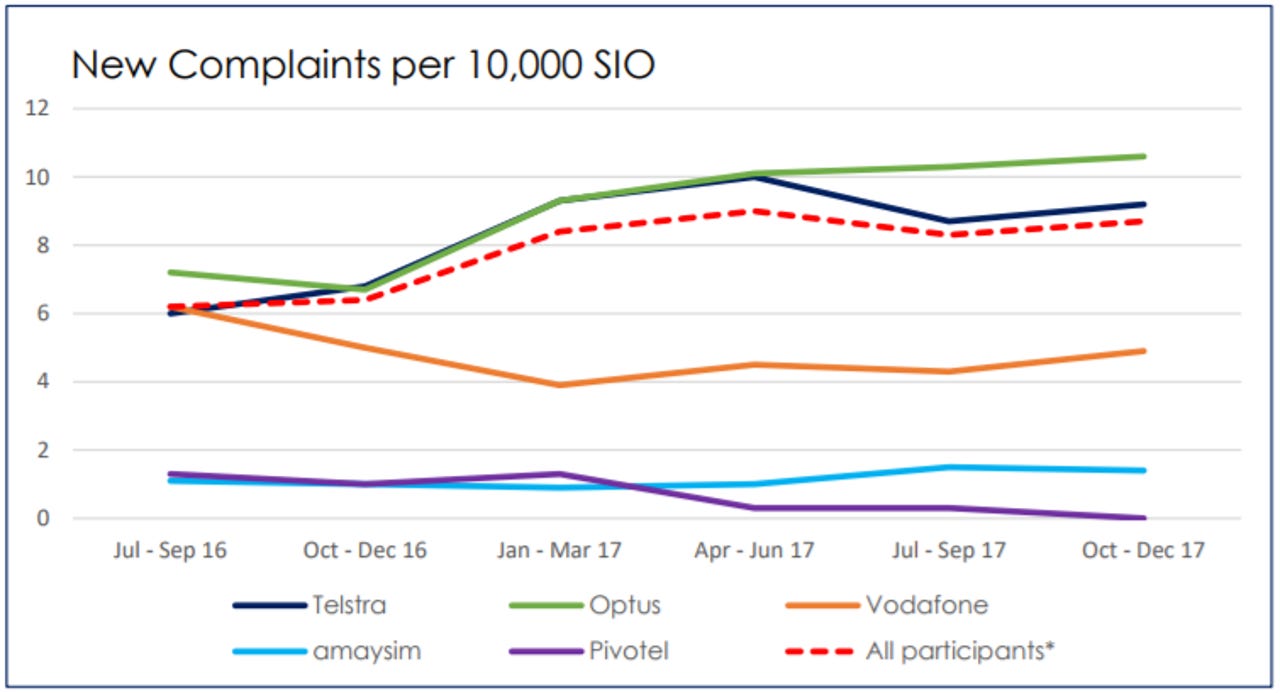Telstra, Optus, Vodafone complaints rise as zero recorded for Pivotel


Telco complaints have risen from 8.3 to 8.7 complaints per 10,000 services in operation (SIO) on average, according to the latest quarterly report published by the Australian Telecommunications Industry Ombudsman (TIO) and Communications Alliance, with Telstra, Optus, and Vodafone Australia all clocking in at higher complaints ratios.
During the quarter to December 2017, Telstra had a complaints ratio of 9.2 per 10,000 SIO, up from 8.7 last quarter. Optus similarly had a ratio of 10.6 complaints per 10,000 SIO, up from 10.3, while Vodafone rose from 4.3 to 4.9 complaints per 10,000 SIO this quarter.
Pivotel clocked zero complaints over the period, while Amaysim's dropped slightly, from 1.5 to 1.4 complaints per 10,000 SIO.
Every quarter, the TIO in conjunction with Comms Alliance publishes a Complaints in Context report covering landline, mobile, and internet service complaints from residential and small business consumers.
With Telstra having previously attributed its rising complaints in context scores to the disruptive process of moving a significant number of customers from traditional fixed-line broadband onto National Broadband Network (NBN) services, Comms Alliance CEO John Stanton has said the continuing rise in complaints across the three major telcos "shows the ongoing challenges the industry is facing".
"Industry will continue developing and implementing initiatives to improve the customer experience, and is coordinating with the ACMA on their recently announced measures to improve the NBN consumer experience," Stanton said on Thursday.
During the quarter to December, the Australian Competition and Consumer Commission (ACCC) succeeded in getting Telstra, Optus, and TPG to refund NBN customers who had been receiving slower speeds than they were paying for.
Following the TIO's annual report showing NBN complaints have risen, the telcos are now also implementing the ACCC's speed guidelines and working together on improving customer issues, with NBN also focusing on improving customer experience while the ACCC conducts an inquiry into wholesale service standards and undertakes its broadband monitoring program and the ACMA investigates fines for installation delays.
Vodafone has only just launched its NBN offering as of December 3.
The TIO's annual report for 2016-17 showed complaints about Telstra rising by 43.5 percent during the year, with a total of 76,650 complaints, 13,536 of which were about services being delivered over the NBN.
Complaints about Optus rose by 31.2 percent to 28,766, 3,938 of which were about NBN services; and complaints about Vodafone rose by 37.5 percent to a total of 10,684, with the numbers prior to the telco launching NBN services.
A report from market research company Kantar in November, meanwhile, said competition between Australia's three major mobile carriers is "intensifying", with Vodafone gaining mobile market share at the expense of Optus and Telstra.
Kantar's statistics for the quarter ending September 30 showed Telstra losing 1.8 percentage points in prepaid since June 2017, 1.4 percentage points in post-paid, and 1.6 points in total mobile market share.
Telstra's totals by the end of the quarter held 37.9 percent of the total mobile market, 34.8 percent of the prepaid market, and 39.6 percent of the post-paid market.
During the same period, Optus increased its prepaid market share by 0.2 percentage points to hold 22.2 percent of the market, and increased its post-paid share by 0.1 points to hold 25.4 percent.
Vodafone Australia gained market share from Telstra and Optus during the quarter, Kantar said -- a reversal of recent trends -- with Vodafone moving its prepaid lot upwards by 1.2 points for 15.6 percent of the market and its post-paid lot by 1.3 points for 15.7 percent market share.
Amaysim/Vaya likewise gained 0.8 points in prepaid and 0.4 points in post-paid for market shares of 7.7 percent and 3.9 percent, respectively.
"Within the prepaid market, Optus, Vodafone, and Amaysim gain share year on year, with this sector driving the decline in Telstra's overall share," Kantar said.
"The desire for cheaper calls and a larger data allowance grow as factors for influencing choice of network, with both of these reasons becoming increasingly important among customers choosing Vodafone and Amaysim."
Related Coverage
Clearing part of Fed Square better than 'toasted' Apple store in Sydney: Andrews
Dear Daniel Andrews, Sydney already has an Apple store in its CBD, and probably doesn't need the toasted sandwich that Melbourne will get.
M1 snags 20K additional mobile subs ahead of TPG network launch
While losing 25,000 prepaid mobile customers across 2017, M1 gained 45,000 post-paid customers, although it is expecting competition to grow once fourth provider TPG enters the market at the end of this year.
Telstra transmission network hits 400Gbps
Telstra, Ericsson, and Ciena have announced attaining speeds of 400Gbps across the telco's transmission network using 61.5GHz spectrum in Melbourne.
Verizon adds 1.2M net customer additions in Q4, ups 2018 growth outlook
Verizon also got a big tax boost that added a bevy of moving parts to the bottom line. The company will outline how it plans to spend the tax gains.
Android will now tell you the speed of a Wi-Fi network, and what you can do on it, before you connect (TechRepublic)
The latest update to Android Oreo starts rolling out today on select devices.
Apple iOS 11.3 preview includes Business Chat and switch to turn off iPhone throttling (TechRepublic)
The Business Chat feature will allow iOS users to communicate with a business directly in the Messages app.
Top 5: Ways to keep your data safe while traveling (TechRepublic)
Airport Wi-Fi, public USB charging stations, and border agents just doing their jobs can all pose a threat to your cybersecurity. Here are five tips to reduce the threats.
Mobile device computing policy (Tech Pro Research)
Mobile devices offer convenience and flexibility for the modern workforce-but they also bring associated risks and support issues. This policy establishes guidelines to help ensure safe and productive mobility.